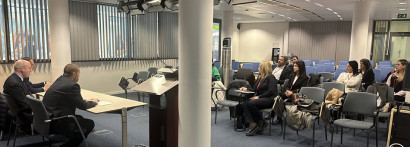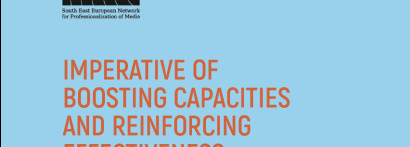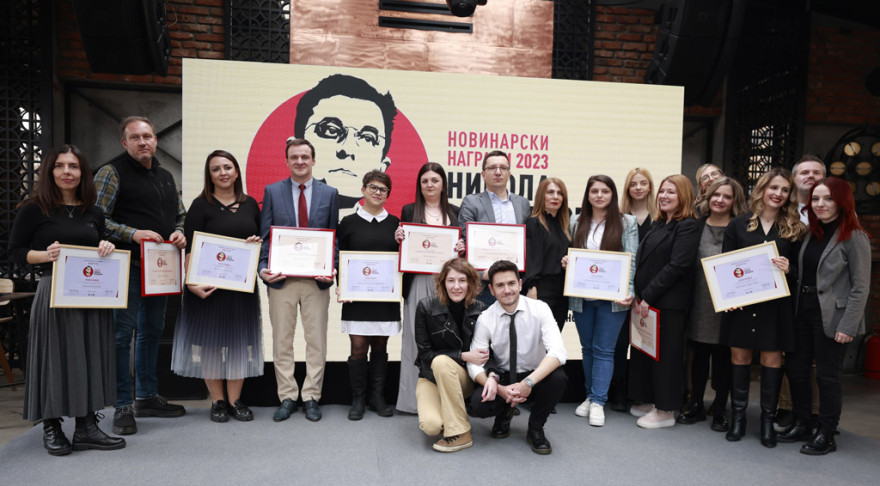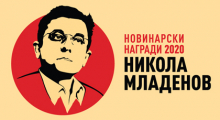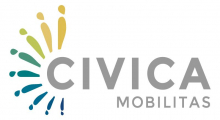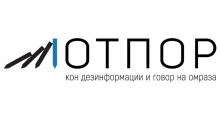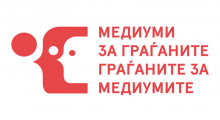
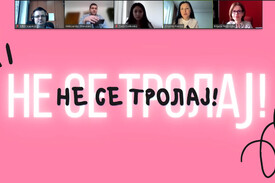
Young innovators with ideas on trolling prevention and media reality education
Don’t Troll” is the winning idea of the three-day hackathon attended by young people from several cities in N. Macedonia, organized in 3 teams. The winning proposed solution addresses the problem of "trolling" on social media, as one of the most common forms of cyberbullying on various grounds. The winning team offered a solution for the creation and promotion of “troll-free” social media environments by establishing a code of conduct that will prevent “trolling”, especially to girls and women active on social media. The aim is to establish a kind of self-regulated social media communities by adopting the code of conduct in order to become and be labeled as "troll-free" environments, safe for users. Moreover, the other two teams offered exceptionally interesting and quality solutions on the topics of "Junior Detective" and "Choose Your News". The idea “Junior Detective” offers a set of solutions for educating primary school students about the basic principles of media literacy through educative games, talking with their favorite social media influencers, and short interactive lectures about the world of media and media reality. “Choose your news” is a proposed solution about a mobile and desktop application which will offer education for media literacy and a set of tools for informing young people about the possibilities of social inclusion. The Hackathon “YouthForMILSolutions” was held from 26 to 28 April, 2021, within the regional project "Media for Citizens - Citizens for Media" , implemented by several media organizations from the Western Balkans, including MIM, with financial support from the European Union. During the Hackathon the participant exchanged ideas and competed in the use of knowledge regarding media and information literacy. The aim was to design initiatives and innovative solutions for effective recognition and purposeful use of information from publicly available media sources, as well as to offer solutions for combating misinformation and other negative phenomena of digital media. At the first day, the participants were introduced to the necessary steps that need to be taken for an idea to become a reality, as well as the key skills for presenting ideas to the stakeholders. Through practical exercises they prepared for what follows - designing and presenting their own conceptual solutions. During the second day of the Hackathon the participants found out useful tips on how to protect themselves from disinformation and how to “sell” their ideas by using tools for visualization and creation of multimedia presentations. At the final working day, the young innovators finalized and presented their solutions in front of the jury. The participants offered exceptional quality ideas, elaborated in details, with concrete steps for realization. The three-day Hackathon resulted in proposed solutions which significantly can help young people in raising awareness and advancing knowledge about the media world, preventing dangers in the digital reality, as well as ensuring safe using and sharing information on the Internet.
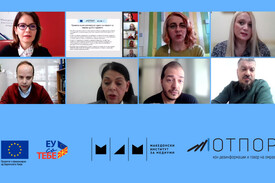
Education, proactivity and consistent implementation of the (self)regulatory mechanisms for successful fighting disinformation and hate speech
Improving court practice and strengthening media self-regulation are key factors to fighting hate speech and disinformation in the public communication. This is one of the conclusions from the panel discussion “Effectiveness of the Legal and Self-Regulatory Mechanisms in Fighting Hate Speech and Disinformation in North Macedonia”, organised by the Macedonian Institute for Media (MIM). Speakers at the panel discussion were representatives from regulatory and self-regulatory bodies, as well as members of the media community. They spoke about the current situation with hate speech and disinformation in the public discourse, particularly considering the trends that are set by the new media and social networks. Opening the discussion, MIM presented the analysis "Regulatory and Self-Regulatory Framework Against Hate Speech and Disinformation in the Republic of North Macedonia” which presents a factsheet on the basic legal and self-regulatory mechanisms regarding these issues. Emilija Petreska-Kamenjarova from the Agency for Audio and Audio-Visual Media Services, in her speech pointed that the regulatory body always acts against cases of hate speech in media in accordance with the rules defined in the Guidelines for Monitoring Hate Speech which transpose the practice of the European Court of Human Rights. “When you need to establish that particular media outlet is responsible for disseminating or supporting hate speech, you should take a measure to limit the freedom of expression and that has to be exceptionally well founded and evidence based decision. The initial step is to establish whether there is hate speech, because not everything we dislike in the public discourse is hate speech” said Petreska-Kamenjarova. Media are responsible for regular review and prompt removal of user comments published under the journalistic content on the web pages or social networks, which contain hate speech and have the potential to cause damaging consequences in the society, considers Marina Tuneva, director of the Council on Media Ethics. “In no case should media allow to be misused and serve as tools for disseminating hate, calling for individuals to unite for radical actions and acts that disturb public peace and order in the society and other actions”, stated Tuneva. In accordance with Article 10 from the Law on Prevention and Protection against Discrimination, the Commission treats hate speech as harassment, which has the aim to damage the dignity and integrity of the person, stated Vesna Bendevska, member and until recently president of the Commission. “The Commission so far has investigated 30 cases which pertain to harassing speech, that has always been based on some of the discriminatory grounds laid down in the Law” said Bendevska. She added that increased number of cases of hate speech have been noted during certain societal events, such as the Pride Parade, or during electoral campaigns, when hate speech targets the political beliefs. Dragan Sekulovski, Executive Director of the Association of Journalists of Macedonia (AJM) underlined that although the country was lagging behind in court practice regarding hate speech, however, the recent first verdict for hate speech on Facebook, reached in favour of the AJM, is sign of hope that steadily there will be court practice for such deeds. “Last year the AJM in talks with the responsible judicial bodies, as well as with the Ministry of Justice, requested the establishment of separate unit within the Basic Public Prosecutor’s Office, composed of prosecutors that would be trained and possess the necessary expertise for deeds related to hate speech, as it is a matter of quite specific cases, particularly when it comes to verbal acts committed online” added Sekulovski. This panel discussion was organized within Resilience: Civil Society for Media Free of Hate and Disinformation , a regional project financially supported by the European Union and implemented in the Western Balkans and Turkey by a consortium of media development organizations led by SEENPM . It is part of a series of publications on the same general topic researched in Albania, Bosnia and Herzegovina, Kosovo, Montenegro, North Macedonia, Serbia and Turkey (all publications are available on the SEENPM website ).
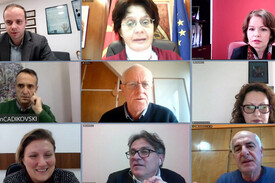
The work of the professional media as affected by plagiarism
Protecting the copyright in the media sphere is one of the key challenges faced by journalists, photojournalists and media workers in the country, especially after the advent of modern digital newsrooms. The legal possibilities for dealing with plagiarism and the role of the relevant institutions was the main topic of the two-day workshop organized by the Macedonian Institute for Media and the Association of Journalists of Macedonia, in order to encourage a debate among the stakeholders and exchange positive experiences on issues related to copyright protection. During the first day of the workshop, 40 journalists, photo-reporters, media workers, lawyers and representatives of the Ministry of Culture discussed the Law on Copyright and Other Related Rights and its implementation in order to protect the rights of media workers. In her address, the Minister of Culture Irena Stefoska, said that the Ministry is working on amendments to the Law on Copyright and Related Rights in accordance with the European standards and that soon the draft text of the Law with the included amendments will be sent for insight and opinion to all interested parties before it enters the government procedure. The President of the European Federation of Journalists, Mogens Blicher Bjeregrerd, informed about the efforts of the Federation for improvement of the European framework related to copyright and rights of journalists. He pointed out that copyright protection is an important precondition for improving the economic situation of the media workers and that they are entitled to compensation when their copyright works are published in the media. The participants also considered the legal specifics of the Law on Copyright in the context of the work of the media, especially from the perspective of the professional online media that suffer the most from the copy-paste journalism. Goran Mihajlovski and Aleksandar Damovski, both editors running the online media Sdk.mk and MKD.mk, respectively, cited the issue of unauthorized downloading of content from their media, noting that there were examples of court cases when some of the courts did not recognize their Internet portals as media. Neda Zdraveva, professor at the Faculty of Law "Iustinianus Primus" pointed out that not all media products are copyright works. "Media products that are usually transmission of official texts of a political, legislative and judicial nature, as well as other daily news that have the character of ordinary - media information, simple facts and data cannot be considered copyright", said Zdraveva. According to her, in order for the media information to be considered a copyright work, it is necessary for the author or the journalist to have his own intellectual contribution in their creation. The concept of collective copyright management and the legal practice in copyright protection of journalists and media workers were the focal topics for the second day of the workshops. The participants raised the question of unauthorized downloading of copyrighted photographs and how can the self-regulation and mediation help overcome the problem of unauthorized downloading of audiovisual content. Arbnora Mehmeti, a photo reporter in the Meta.mk news agency, pointed out the problem of media copying photos, and the same goes for the political parties, emphasizing that all photos, even on the Internet, were created by someone, and care must be taken on respecting the copyrights. Lawyer Natalija Milenkova pointed out that the practice has shown that it is much easier to prove authorship in photographs, while in journalistic texts it is more complicated to prove the violation of copyright, especially when there is a drastic change of the original text. The general conclusions from the two-day event were the need for amendments of the Law on Copyrights in order to further recognize the copyright of the journalistic works, which would be considered as an important aspect in future court proceedings in which journalists would claim their rights. According to the current practice, the costs of court proceedings before the civil courts are expensive and that is one of the reasons why journalists and photojournalists rarely dare to sue, which results in a very modest court practice. High administrative costs in litigation can also lead to closure of some online media outlets that have been found to have published photos without prior consent of the authors. Additional training of judges is needed on these topics in the Macedonian judiciary, whether it is a civil or criminal court, given that there is very little practice when it comes to these acts. This is especially important in the long run, because the media workers have greater confidence in the justice system only if there fair judgments that are in line with the ECtHR practice. The event was organized as part of the "Promoting Media and Information Literacy and Strengthening Independent Media in the Western Balkans" project implemented by the Albany Associates from London in partnership with regional media development organizations, including the Macedonian Institute for Media. The project is funded by the British Government.
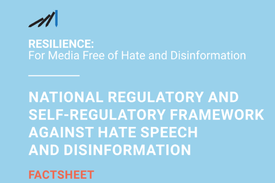
Regulatory and self-regulatory framework against hate speech and disinformation in North Macedonia
This factsheet aims to analyze the national regulatory and self-regulatory framework against disinformation and hate speech in North Macedonia. Hate speech in North Macedonia has been on the rise throughout 2020 and 2021, particularly online. The regulatory framework on hate speech has been stipulated in several laws and the media self-regulatory body also has a mandate to react. Disinformation has not been regulated by law; it is within the mandate of self-regulation and fact-checking services. A high level of impunity, given the poor court practice on crimes related to hate speech or other serious verbal delicts, is still present in the country. The data gathered from 26 basic courts show that there are five court cases related to hate speech, or more specifically to causing national, racial and religious hatred, discord and intolerance. Download the publication in English. This publication was produced within Resilience: Civil Society for Media Free of Hate and Disinformation , a regional project financially supported by the European Union and implemented in the Western Balkans and Turkey by a consortium of media development organizations led by SEENPM . It is part of a series of publications on the same general topic researched in Albania, Bosnia and Herzegovina, Kosovo, Montenegro, North Macedonia, Serbia and Turkey (all publications are available on the SEENPM website ).

